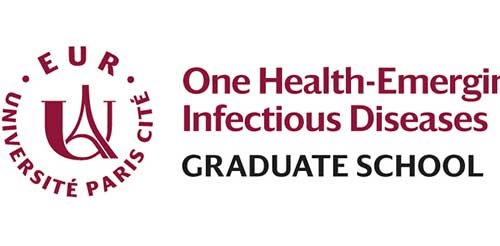Vaccinology
- Duration: 8 weeks
- Effort: 19 hours
- Pace: ~2h15/week
- Languages: English and french
What you will learn
At the end of this course, you will be able to:
- Summarize the basics of vaccinology
- Define vaccine design and the clinical steps required to develop a vaccine
- Describe recent vaccines that have been developped
- Discuss how to improve the vaccine coverage
- Explain the challenges learnt from the COVID-19 pandemic
Description
Vaccines are among the most effective public health interventions currently available. Smallpox has been eradicated and polio has almost disappeared thanks to global vaccination campaigns. Most viral and bacterial infections that usually affected children have been significantly reduced thanks to national immunization programs in many countries.
In this MOOC, you will navigate the complex path from vaccine design through preclinical and clinical stages to vaccine availability. You will learn about the different types of vaccines available, including those recently developed based on messenger RNA.
You will immerse yourself in case studies illustrating the successes and challenges of vaccine development, with examples such as those against meningitis, human papillomavirus, influenza and COVID-19.
We will tackle the issue of mistrust in vaccines, discover strategies for globalizing their production, and discuss ways of ensuring equitable access for all populations.
Drawing on lessons learned from the COVID-19 pandemic, we will emphasize the importance of pandemic preparedness and consider the role future vaccines can play in this preparation.
Format
This MOOC consists of 4 teaching chapters, each module is composed of 4 to 5 sequences.
Each session includes a video lasting around ten minutes.
There are two MCQs after each session and a set of MCQs at the end of each chapter, allowing learners to test their understanding. At the end of each chapter, a set of MCQs is offered again. The videos are in English, with subtitles in English and French. The MCQs are in English and French.
Prerequisites
This MOOC is aimed at anyone wishing to learn more about vaccinology, including scientists, medical doctors and other healthcare professionals, government and non-government agencies staff and life science students.
A good level of scientific knowledge is recommended to follow this MOOC (such as a bachelor of biomedical science with a background in immunology and microbiology).
Assessment and certification
To follow this course, you can choose between two options:
- The Discovery Course gives access to videos, quizzes and discussions in the forum. No badge is issued for this course. Registration is free.
- The Qualifying Course leads to a certificate. In addition to the activities of the Discovery Course, you will have to take a one-hour supervised distance learning exam, consisting of 30 multiple-choice questions (MCQs) and obtaining 18 correct answers. The registration fee for the Qualifying Course is 150€.
Successful completion of the Qualifying Course gives you the opportunity to apply for the Institut Pasteur Online Diploma of Infectious Diseases (DNM2IP), which consists of 5 certificates to Institut Pasteur MOOCs on infectious diseases. To learn more, visit the Institut Pasteur's web page dedicated to this diploma.
Course plan
- • C1-1: History of vaccines - Rino Rappuoli
• C1-2: Smallpox eradication: what about polio? - David Heymann
• C1-3 : Epidemiology data for decision-making in vaccine development - Helen Campbell
• C1-4 : Mathematical modeling for decision-making in vaccine development - Peter White
• C1-5 : What a vaccinologist should know about the basics of immunology - Behazine Combadière
- • C2-1 : Antigen discovery: from genomics to proteomics - Maria Grazia Pizza
• C2-2 : Vaccine platforms overview - Frédéric Tangy
• C2-3 : Adjuvants - Giuseppe Del Guidice
• C2-4 : mRNA vaccines: the breakthrough - Steve Pascolo
• C2-5 : From preclinical to clinical steps for vaccine development - Christiane Gerke
- • C3-1 : Glycoconjugate vaccines against meningitis - Muhamed Kheir Taha
• C3-2 : Human Papilloma Virus (HPV): a vaccine against virus-induced cancer - Margaret Stanley
• C3-3 : Influenza vaccines: challenge of making a new vaccine each year - Peter Openshaw
• C3-4 : COVID-19 vaccine - Jérôme Kim
- • C4-1 : Vaccine hesitancy - Emilie Karafillakis
• C4-2 : Globalization of vaccines production - Joël Calmet
• C4-3 : How to make vaccines accessible to the populations in need? - Frédéric Debellut
• C4-4 : Pandemic Preparedness - Jakob Cramer
• C4-5 : Future vaccines - Rino Rappuoli
Course team
Armelle Phalipon
Categories
Chetan Chitnis
Categories
Laurie Pinaud
Categories
Organizations
Partners

License
License for the course content

Attribution-NonCommercial-NoDerivatives
You are free to:
- Share — copy and redistribute the material in any medium or format
Under the following terms:
- Attribution — You must give appropriate credit, provide a link to the license, and indicate if changes were made. You may do so in any reasonable manner, but not in any way that suggests the licensor endorses you or your use.
- NonCommercial — You may not use the material for commercial purposes.
- NoDerivatives — If you remix, transform, or build upon the material, you may not distribute the modified material.
License for the content created by course participants

All rights reserved
"All rights reserved" is a copyright formality indicating that the copyright holder reserves, or holds for its own use, all the rights provided by copyright law.





